Why study Christianity and Business?
Study Christianity, Ethics and Business (Course Master Doctorate)
This Professional Course is aimed primarily at those executives and enterprises wishing to do business in the countries where Christianity, Catholicism (50% of all Christendom) and Protestantism (37%), is the majority religion. These “Christian” countries make up the Economic Area of Western Civilization, made up of the European Economic Area (26% of Christianity), American Economic Area (37%), African Economic Area (24%) and Oceanian Economic Area.
Anyone who does not belong to Western Civilization (Islamic, Hindu, Buddhist, Sinic...) should know the pillars of Christianity, both Catholicism and Protestantism, and how they influence the way of doing business of western enterprises, which can be very different compared to enterprises of other economic areas, and thus avoid intercultural conflicts.
Related Doctorate, Masters and Courses offered by EENI Global Business School:
- Courses: Christianity, Ethics and Business
- Doctorate (DIB): Ethics, Religions & International Business, African Business
- Masters (MIB): Religions & Business, Business in Africa, International Business

Religions and Global Business -
Religious diversity
Why study the course “Christianity, Ethics and Business”?
Christianity is the largest religion in the world (2,400 million), that is: one third of humanity is Christian. 126 countries have a Christian majority, while 71 countries have a significant Christian minority.

In these markets, influence of Christianity is very important in the way of doing business and in its culture.
Therefore, the pillars of Christianity will be analyzed: Ten Commandments, Sermon on the Mount, Dogmas of Christianity as well as the different Christian denominations.
The distribution of Christianity in the World (America, Europe, Africa, Asia), Catholicism (Africa, America, Asia, Europe) and Protestantism in the World will also be studied.
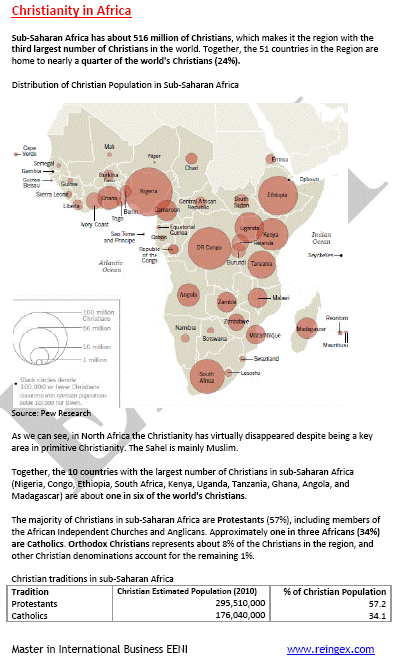
different Christian churches will be analyzed: Quakers, Calvinists, Presbyterians, Methodists, Baptists, Pentecostals, Eastern Catholic Churches (Maronites and Chaldeans), Anglican Church (Justin Welby) and Mormons.
We will also analyze the profile of several current Christian Spiritual Leaders such as Leo Tolstoy, Albert Schweitzer, Martin Luther King, Vincent Ferrer, Hans Kung or Desmond Tutu, this analysis will help us to better understand Christianity. The role of Caritas (the humanitarian institution of the Catholic Church) will also be studied.
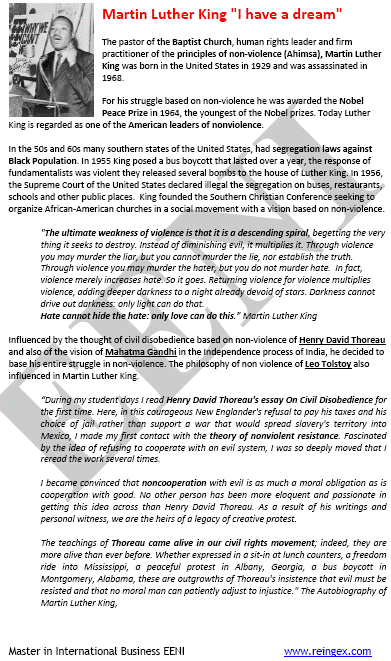
To better understand influence of Christianity on business, student will analyze profiles of several businesspersons, mainly from the African economic area (the most unknown, and one with the most significant economic growth) and from the North American economic area (where many of the largest enterprises in the world are located).
African Christian Businesswomen.
- Isabel dos Santos: the richest woman in Africa (Angola): investments in Africa and Europe
- Folorunsho Alakija: the richest Nigerian woman (oil enterprises, fashion...)
- Cheryl Carolus: founder of PETONA, a black empowerment company with investments around the world (South Africa)
- Divine Ndhlukula: considered by Forbes (2012) as the most successful business woman in Africa (Zimbabwe)
- Mimi Alemayehou: one of the most powerful African executives (Ethiopia)
- Amini Kajunju: President of the African-American Institute (DR Congo)
The figures of two important African politics are also studied:
- H.E. Nkosazana Dlamini-Zuma: Former President of the Commission of the African Union (South Africa)
- Ellen Johnson-Sirleaf: former president of Liberia and Nobel Peace Prize winner
African Christian Businesspeople
- Patrice Motsepe: the richest South African businessman (mining enterprises). He donated 1 million dollars to fight against Ebola
- Cyril Ramaphosa: director of the Sanduka Group and one of the main shareholders of the African telecommunications company MTM (South Africa)
- Mike Adenuga: the third richest African, founder of the telecommunications company Globacom (Nigeria)
- Theophilus Danjuma: founder of one of the largest oil producers in Africa. He donated 100 million dollars to improve the health in Nigeria
- Orji Uzor Kalu: Nigerian businessman and philanthropist
- Strive Masiyiwa: one of the key personalities in the telecommunications sector in Africa: founder of Econet Wireless Group (Zimbabwe)
- Sifiso Dabengwa: director of the largest telecommunications company in Africa: MTN Group (Zimbabwe)
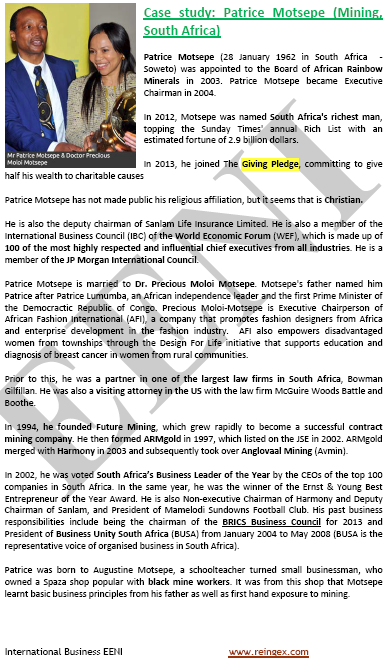
American Christian Businesspeople.
- Carlos Slim: one of the richest men in the world, significant philanthropic activities, is a Maronite Christian (Mexico)
- Antonio Moraes: founder of the Votorantim Group, is one of the richest people in the world and an important philanthropist (Brazil)
- John Marinho: president of the Globo Organization, the largest media conglomerate in Brazil
- Luis Sarmiento: businessman, philanthropist and banker (Colombia)
- Philip Anschutz: businessman and philanthropist (US, Presbyterian)
- Truett Cathy: businessman and philanthropist (US, Baptist)
- Ray Hunt: Methodist businessman (U.S.)
- Howard Ahmanson: Entrepreneur of the United States (Protestant, Pentecostal)
- Steve Strang: Pentecostal businessman (U.S.)
- Thomas Monaghan: North-American Catholic businessman. Founder of Domino Pizza. After selling Domino Pizza he took the vows of poverty
The profiles of Amancio Ortega (founder of the Spanish fashion group Inditex and one of the world's largest philanthropists) or the Chaldean businessman Nadhmi Shakir Auchi will also be studied.
In the course, the characteristics of the different Christian-Western Economic Areas are studied: European, Hispanic American, North American, Caribbean and Oceania.
It also includes the study of African Economic Areas, although they belong to African Civilization, where Christianity is the majority (Central African and the Southern African Economic Area), and Western African and the Eastern African Economic Area, where Christianity and Islam (along with African traditional religions) are the main beliefs.
Sample: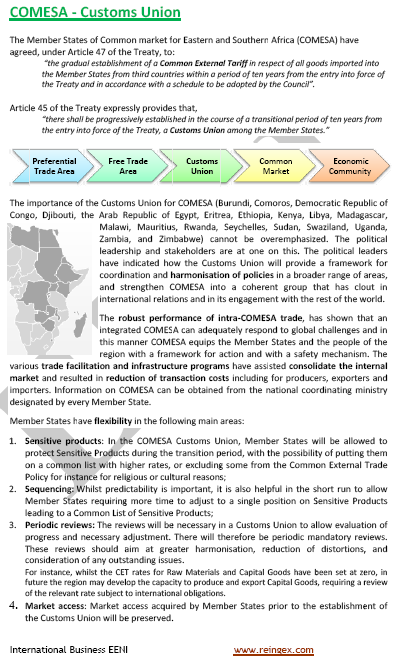
For each of these economic areas, student will analyze a summary of the main Economic Organizations, trade agreements, as well as the profile of each of the countries. In addition, interactions between these economic areas and political-economic relations with other civilizations will be analyzed.
The influence of Agnosticism and Judaism and Ethical Principles of Judaism on the economic areas of Christian-Western Civilization is also analyzed.
The role of Agnosticism and Judaism in the economic areas of Western Civilization is also analyzed.
Jewish businessmen
- Joseph Safra: one of the richest bankers in the world (Brazil)
- Wendy Appelbaum: investor and South African business woman
- Issad Rebrab: founder of CEVITAL one of the most important African business groups (Algeria)
- Other Jewish businessmen
The world's largest philanthropic initiative, The Giving Pledge, created by two agnostic: Warren Buffett (one of the world's largest investors) and Bill Gates (founder of Microsoft) will also be studied.
In the appendix of the Professional Course, the Transatlantic Slave Trade, effects of Slave Trade, Abolition of Slavery and its impact on the socio-economic development of African, European and American economic areas (African Diaspora in America) will be studied.
Sample: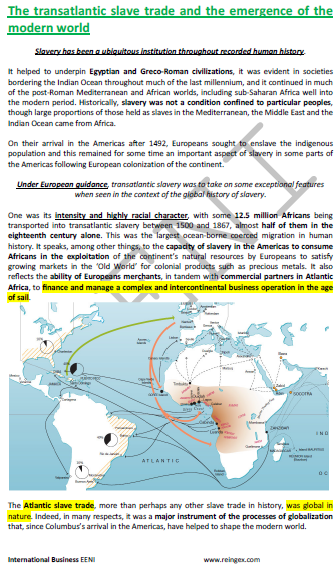
Therefore, this course is also recommended for anyone wishing to do business with enterprises in Western Economic Areas anywhere in the world or who want to work in a company of a western origin.
(c) EENI Global Business School (1995-2025)
Top of this page












 WhatsApp
WhatsApp

